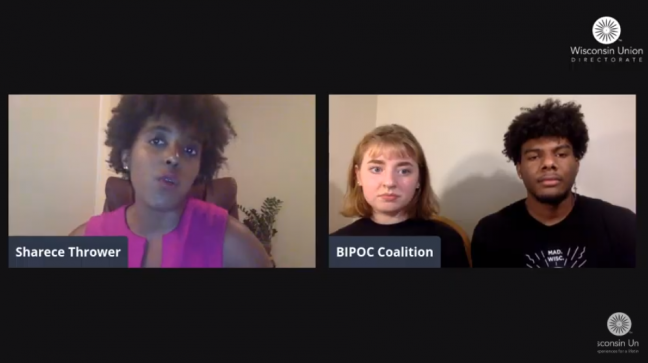The Wisconsin Union Directorate kickstarted its Rise Up week Monday with a town hall with Vanderbilt University Associate Professor of Political Science Sharece Thrower on “The Powers of the Next President.”
The town hall was moderated by the University of Wisconsin BIPOC Coalition, Associated Students of Madison and the American Civil Liberties Union Student Alliance.
Thrower broadly studies executive power and the ways in which the president, executive branch agencies, governors and other actors at the state level are constrained by different branches of government. Thrower said the United States president has two kinds of powers — formal powers, which are explicitly given to the president, and informal powers, which are powers that the president can exercise but are not given in the Constitution.
“The President has the ability to basically expand … and shape the way the executive branch [is] implementing these laws through regulations and the way that they’re interpreting these laws,” Thrower said. “The executive branch makes rules and regulations on everything imaginable under the sun, such as regarding education, health care, environmental protection, and these are the policies that affect us every day.”
According to Thrower, judges and justices should get to decide cases based on what the law says and what the Constitution does. In reality, however, she said anyone who reads and pays attention knows that it’s much more complicated than that.
Thrower said judges and justices are human, and they decide cases based on their personal preferences and personal ideology.
Thrower said it can be dangerous when a single president is able to appoint people with the same ideology as themselves because when the executive branch is challenged in the court, it is likely the justices will automatically side with the President.
On the topic of student organizations navigating power dynamics within university administration, Thrower said it is important for them to identify the cause they are rallying for.
“For student organizations that are facing other power dynamics within university administration … a good first step is to really coalesce on identifying sort of what your group consciousness is, what your interests are, what you’re fighting for, and to really rally behind that and know what it is that you’re fighting for,” Thrower said.
When asked about BIPOC activism, Thrower said the most important thing for white liberals to do is to make sure that Black and brown voices are heard the loudest since they are at the forefront of communicating what their interests are.
Thrower said she has seen many examples where well-intentioned white activists have taken up a lot of space in political activism for Black and brown people and unintentionally drowned out those voices. Thrower said the primary role of white activists should be to ensure Black and brown voices are heard and that there is a system where those voices can be heard.
“Obviously, that may not work out always in all spaces because there are some spaces where, frankly, Black and brown voices are just not in the room,” Thrower said. “I think in those situations … our white liberal allies can be a powerful voice if they hold a position of power, especially in a realm where Black and brown voices aren’t heard.”


